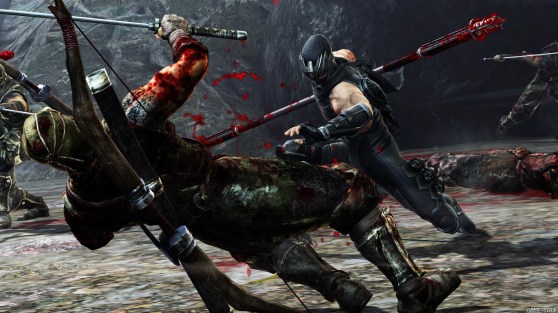Change does not start with Wii U.
Listen, nothing can change the fact that Ubisoft pulled a fast one and delayed Rayman Legends seven months solely for it to go multiplat. We can't force Rockstar to announce a Wii U version of Grand Theft Auto V right here and now. We can't make EA redo their press release of Madden 25 which neglected the existence of Nintendo's new console. And look, the Wii U simply isn't going to get Devil May Cry, Dead Space 3, Dead or Alive 6, Tomb Raider, BioShock Infinite, or many other of those triple-A third party titles coming to PS3 and X360 this year. So, who's to blame?

Hold the celebration, guys.
You may remember back when the Wii U launched I wrote a blog post about how Nintendo's relationship with third parties was about to change with the Wii U. I argued that Nintendo's "lending" of first-party characters to third-parties, their willingness to help other developers improve their games, and their new-found embrace of the indie market proved that Nintendo was really changing. But it seems that the tides have turned since then.
I'm not going to go in-depth with Nintendo's past relationship with third parties, but I think we all know by now that it hasn't been all that great. The Nintendo 64's use of cartridges instead of disks alienated much of Nintendo's existing third-party support thanks to cost, and they've been fighting an uphill battle ever since. The Wii's lack of power was another problem for developers, who could not downscale their existing PS3 and X360 games in order for them to work on the weaker platform. Couple that with the fact that third party games generally sell less on Nintendo consoles, and you've got a pretty big problem coming up to the Wii U
And that comes back to my original question: who's to blame?

Meat Boy didn&#Array;t come to Wii due to WiiWare restrictions.
Let's focus for now on Rayman Legends, shall we? We know from Ubisoft that the only reason why the game was delayed was because they wanted it to go multiplatform. Coming a few weeks before the game's original release date a few weeks after the game had been announced to have gone gold, the announcement enraged hundreds of thousands of fans. Why not just release the game on Wii U first, then release the game on other platforms later?
Many fingers pointed quickly to Microsoft, who had updated their developer terms several months prior:
"Titles for Xbox 360 must ship at least simultaneously with other video game platform, and must have at least feature and content parity on-disc with the other video game platform versions in all regions where the title is available. If these conditions are not met, Microsoft reserves the right to not allow the content to be released on Xbox 360."
So it's Microsoft's fault for delaying Rayman Legends and not Ubisoft's, right? Wrong, or at least the evidence states otherwise. Ninja Gaiden: Razor's Edge was released on Wii U back in September, yet it's coming out on X360 and PS3 this April. Yes, Microsoft has the right to reject any content sent to them, but that does not mean they will. And if Razor's Edge was any indication, they won't.
So it's Ubisoft's fault then, yes? I wouldn't go so far as jump to that conclusion immediately. In fact, with everything that Ubisoft has said in the past week, it seems like they're, indirectly, placing blame on Nintendo.

Proof that the Microsoft excuse doesn&#Array;t work.
Nintendo is a very secretive company, so we may not know exactly what's going on behind the scenes, but one thing is quite apparent: the Wii U isn't selling as well as they've hoped.
Perhaps this is the real reason why Rayman Legends on Wii U was delayed. Sure, going multiplat may have been part of it, but the fact that the Wii U isn't becoming the hit gaming console the Wii was could have been what tipped Ubisoft over the edge. And it makes sense, partially; waiting until the console has a greater install base (which it will undoubtedly have in September) will likely drive more sales in the long run, though one may argue that the higher competition during that time frame may ultimately hurt the game's sales.
And this may also be the greater reason why many of this year's third party games aren't coming to Wii U; third parties are simply afraid that their games won't sell well on the platform. And that's a perfectly fine excuse; do you really want to allocate hundreds of thousands of dollars to port a game onto a platform with such a small install base?

The real reason this isn&#Array;t coming to Wii U: budgets.
But then again, perhaps that's just the reality of today's gaming industry, and there's really no one to blame for all this. All consoles have a post-launch lull (some admittedly more than others) and in today's economy, things can't be much better. Sure, the Wii U's small install base may be part of the problem, but in the grand scheme of things, even if the Wii U had a few million more users, it's still questionable as to whether a Wii U port would fit in every publisher's budget, especially when game companies usually set budgets years in advance.
So maybe we're just thinking too much. Maybe our human desire to place blame on anything or anyone when things to awry has just taken over us for the time being. Perhaps there really was nothing that could have been done to prevent this from happening. Perhaps it's just reality, and unfortunately we have no choice but to live with it.
So what do you guys think? Who is to blame: Nintendo or third parties? Perhaps neither or both? Sound off in the comments below!
![Amazing Spider-Man Finale Features New [SPOILER] Costume](../../../../../../assets1.ignimgs.com/2018/06/01/untitled-br-1527892808294_small.jpg)